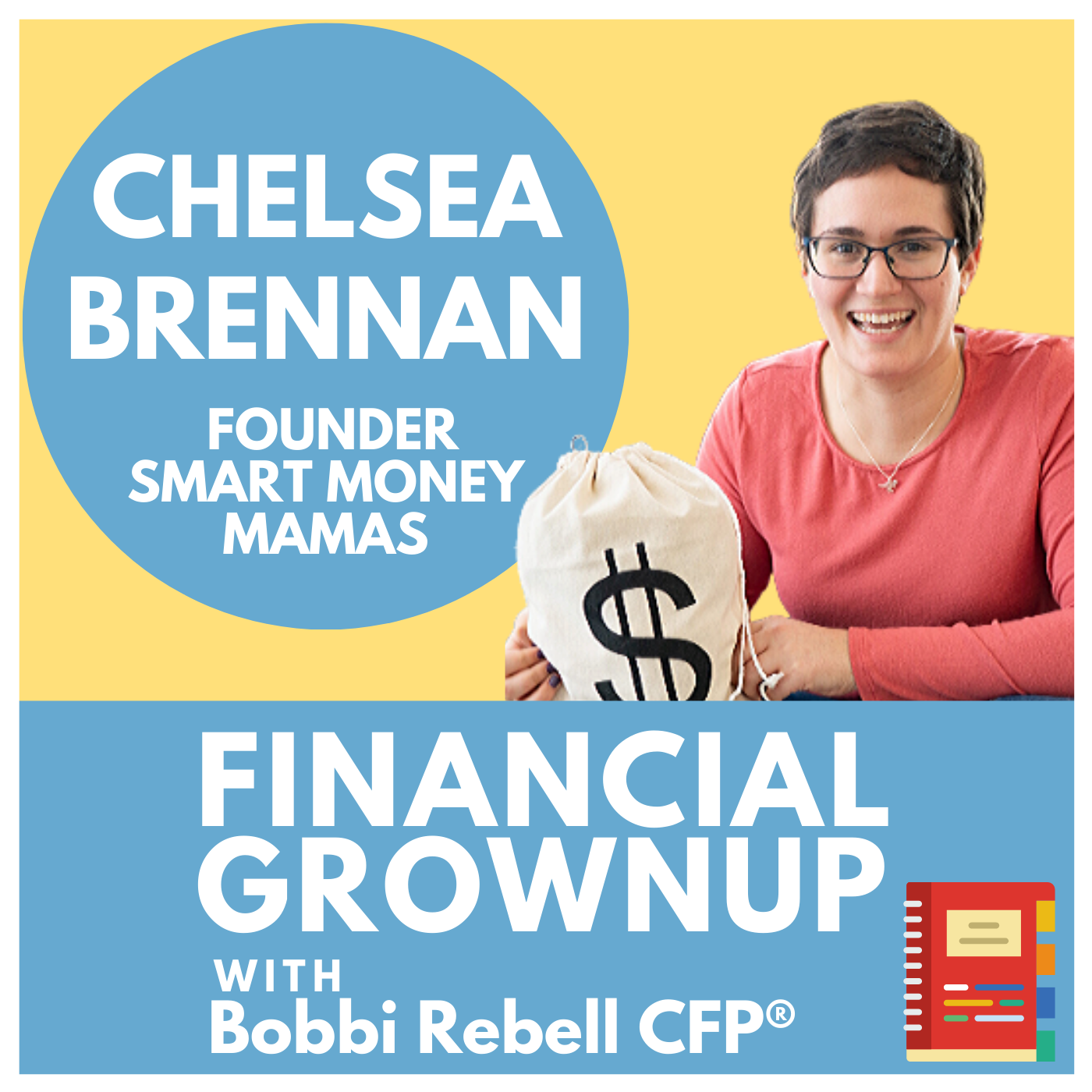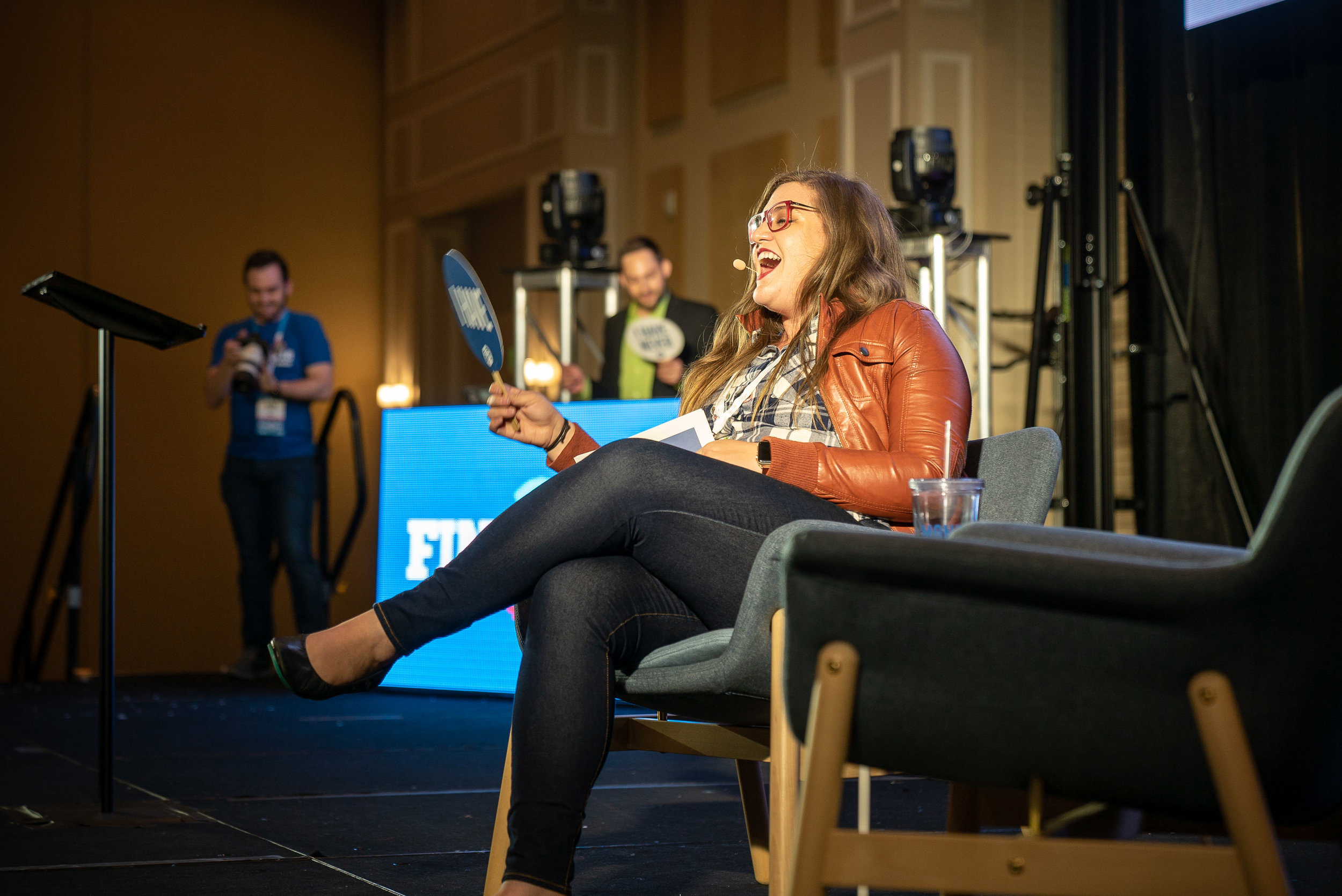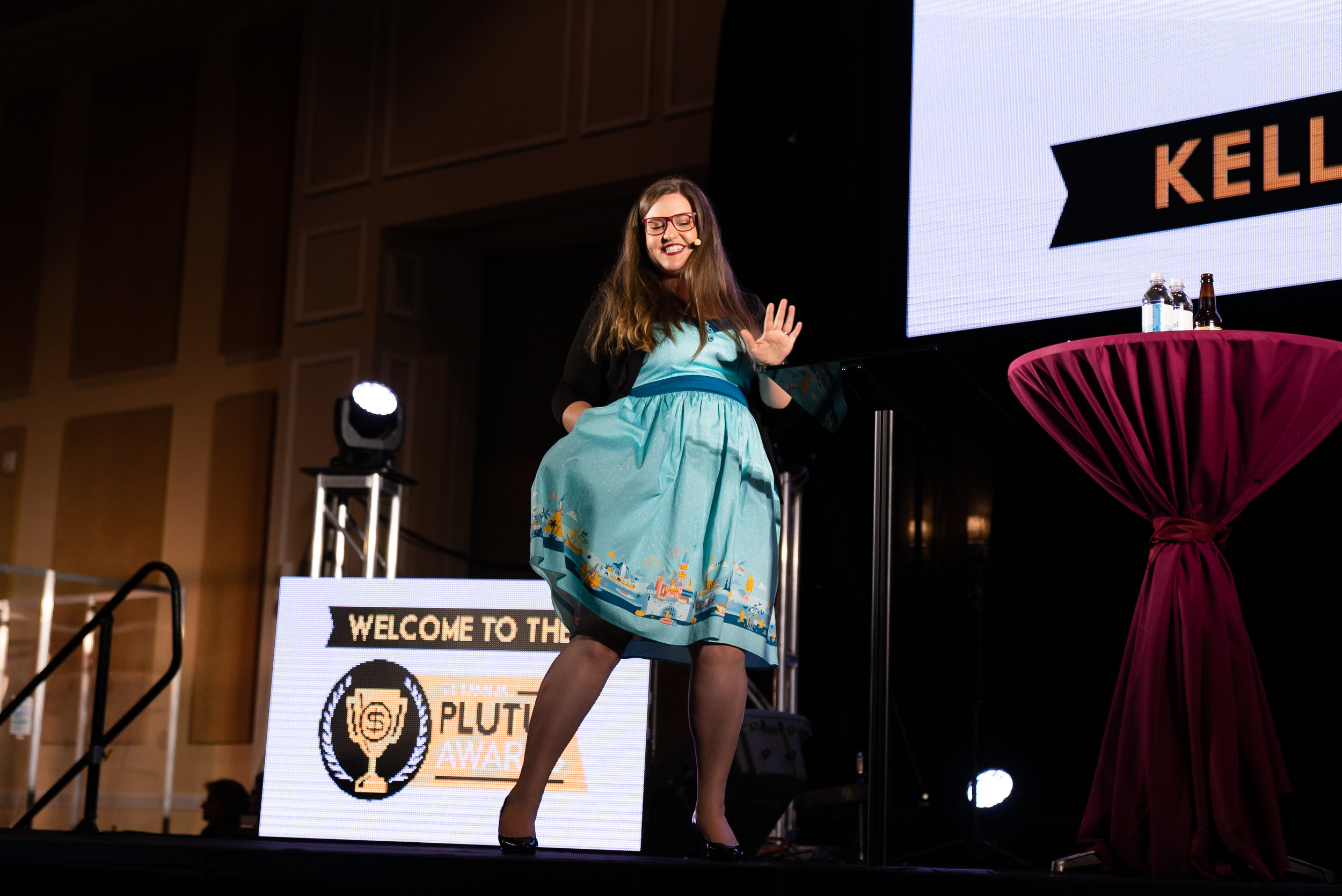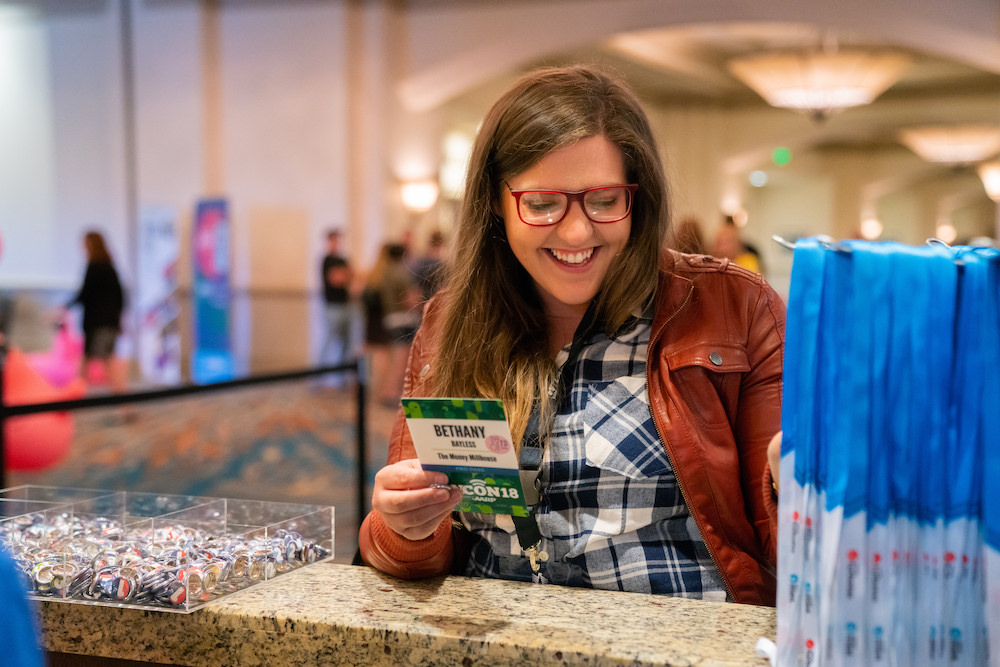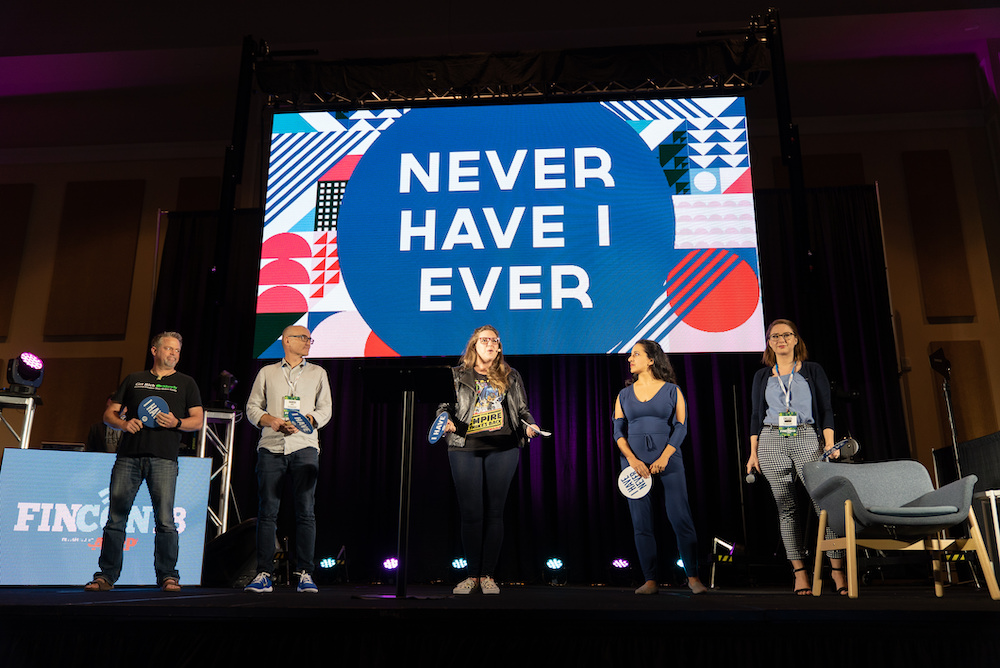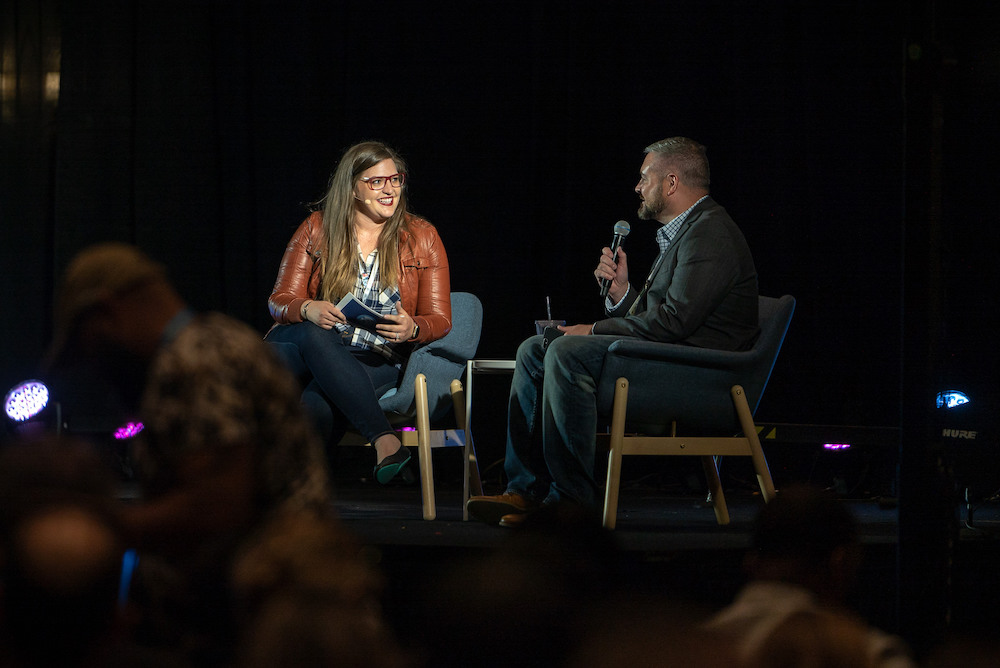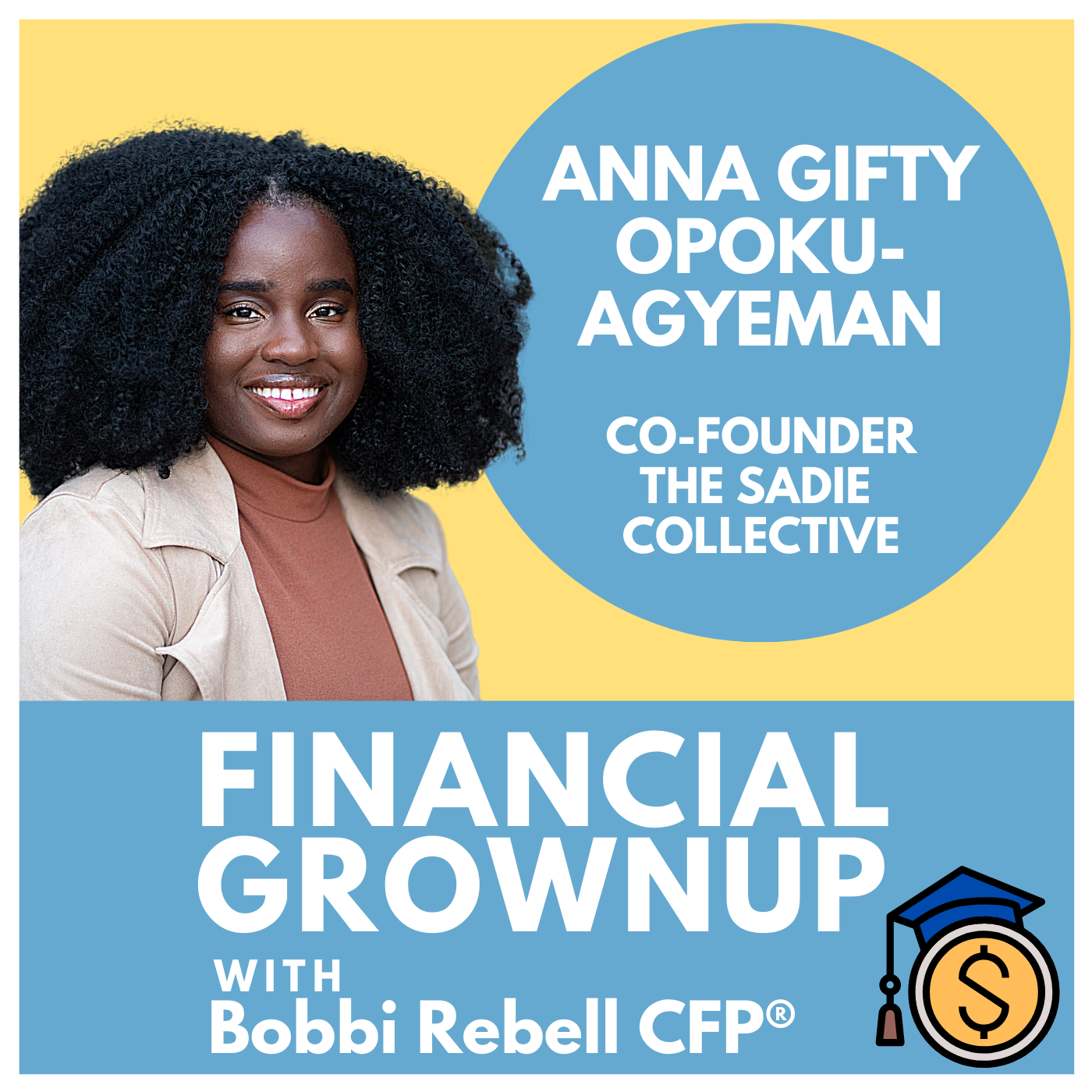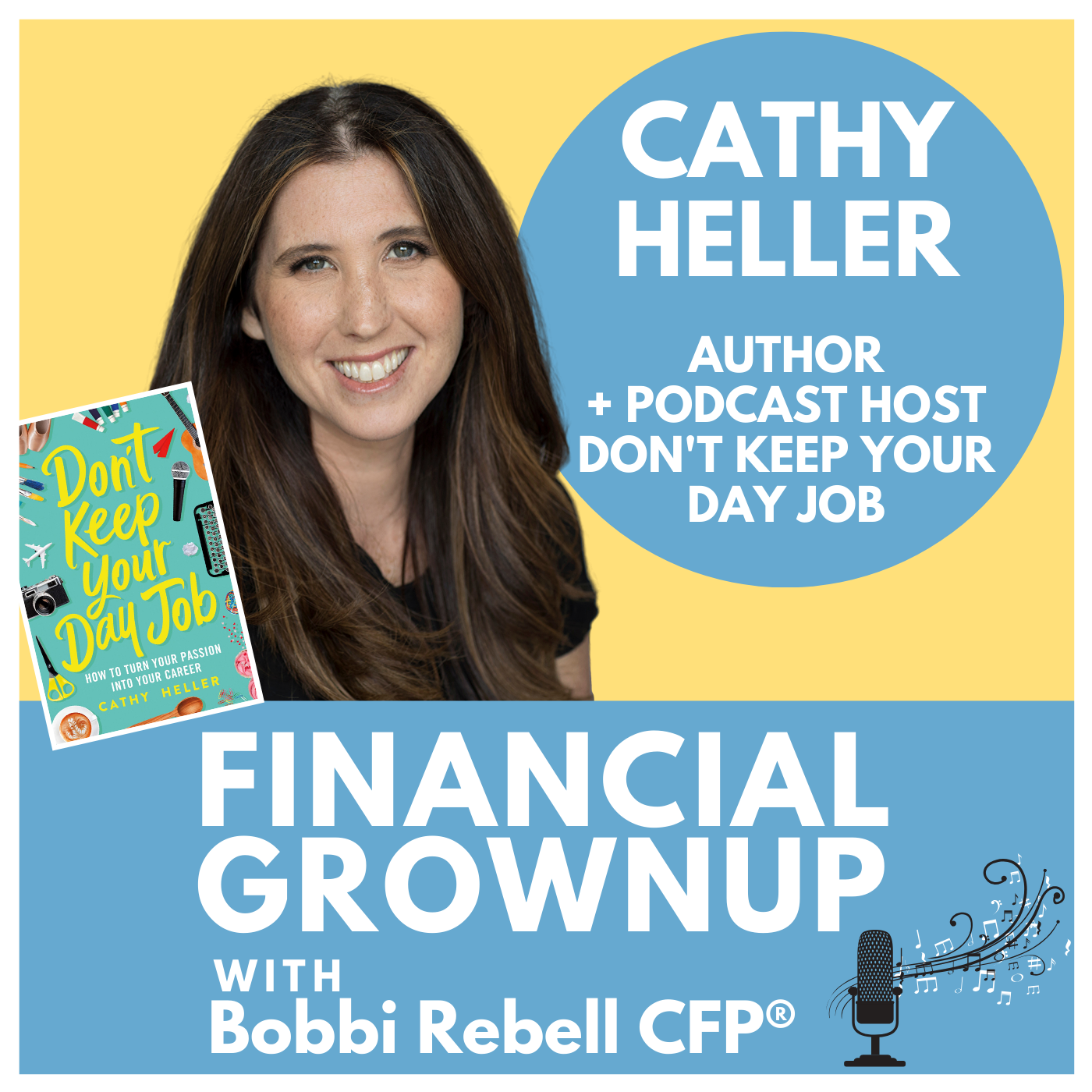Transcription
Bobbi Rebell:
Hey friends. So does the idea of bragging about yourself make you a little bit cringy, maybe a lot cringy? Now with all of us at home, or at least most of us at home, it can feel even more awkward, but our guest today says we have to do it. We have to make it happen. She is going to tell us the right way to do it and most importantly, a way to do it, that we're going to feel good about.
Bobbi Rebell:
First, a quick welcome to everyone to the Financial Grownup podcast. We have been doing a series of Financial Grownup guide episodes during the Coronavirus quarantine, and this one I think really hits home for all of us who are still at home. The advice offered by our guest author, Meredith Fineman, in her new book, Brag Better, was a total eye-opener to me and probably will be to many of you.
Bobbi Rebell:
Although they are easy to implement, they're not things that we necessarily are doing or know about, so it's a really great tutorial on getting comfortable with bragging. I've been putting a lot of her tips to work already and seeing results. Here is Meredith Fineman.
Bobbi Rebell:
Meredith Fineman, I'm so happy you're here and congratulations on your new book.
Meredith Fineman:
Thank you. I'm very happy to be here. And I wrote a book, I did it and it's done. It's out there.
Bobbi Rebell:
And now you get to talk about it and brag better because the book is actually called Brag Better. Tell us about it.
Meredith Fineman:
I really set myself up in this case because I wrote a book about talking about your work, so by proxy, I'm really just going to have to talk until I'm blue in the face to anyone that will listen, which I already do, but it's going to have to be a little bit more extreme.
Bobbi Rebell:
Well, you are the queen of the best kind of what I would call self-promotion, but you do it in a way that works. And you've actually been coaching me behind the scenes even before we hit record here.
Bobbi Rebell:
So first of all, I have a to-do list already of things that I need to be working on. You brought for the Financial Grownup community, 10 Ways to Brag Better which of course is as I said, the name of your book, let's start with the first one. And then by the way, everyone hang on to the end because you have a special gift for the audience when we get to the end.
Bobbi Rebell:
The first of 10 ways to Brag Better though is to make a list because facts are facts. Why is that important to remember? Facts are facts.
Meredith Fineman:
Bragging is stating facts. I mean, if you've done the work, why not talk about it? You're not lying about it. So take a pen, do it on your phone, do it on a Google document, send yourself an email of 10 things that you've achieved, no matter how small you might think they are. So a big thing would be like, "I got this award in my industry." But even if it's like, "I killed this presentation or I did really well in this meeting or I pitched someone to be on my podcast that I was afraid to talk to." All of those things are wins and they're true and they're facts, so bragging is stating facts.
Meredith Fineman:
There are lots of different ways to insert it into whatever it is you're doing. You open up your social media and you're like, "I snagged an interview with Meredith Fineman and I'm so excited." Because also I would want to promote that and then there you have cross promotion. So that's a nice thing someone would say to me on the internet, the idea that someone would think that booking me is a big deal, feels really nice. So then I would retweet that or I would reply and say, "I'm so excited to go on." And people might see that and you make another guest out of it, it's just sharing.
Bobbi Rebell:
All right. Number two, use super power words.
Meredith Fineman:
Yes. So super power words are words to describe your voice and your tone and your brags. But super power words are words that feel like you and feel like how you want to be perceived. So mine-
Bobbi Rebell:
So what are your super powers?
Meredith Fineman:
Yes, mine are funny, thoughtful and helpful. I always love making people laugh and making sure this isn't so boring and feels so much work, and thoughtful, that I've taken almost a decade, developing this concept and thinking about how I want to share it.
Meredith Fineman:
And then helpful helping people brag better. And in this case, those three things are words I think back to, whenever I think about sharing something or doing an interview or writing something.
Bobbi Rebell:
And one of the things that I loved about the book is you then have, I was trying to think of the words for myself and I was drawing a blank. I turned the page and you had a whole list of words that I could kind of circle which ones I thought applied to me. And you also give people permission to change those words as you go through life.
Bobbi Rebell:
So I thought of supportive. I try to be supportive of not just my friends, but also peers in the business. Polished because I always try to appear polished and be polished for my clients and anyone that I interact with in business, and also professional, which is also very important in this time we're in with this quarantine is to remain professional when you are working. So those are mine right now that I pulled from your list, but they can change.
Meredith Fineman:
And you don't have to be married to them. I've gone through lots of different 'voices' in terms of how I've written or the work that I've done. And it will probably also change, but it's grounding to just at least narrow it down to three things. And there is a list in the book of all different adjectives that you can use that hopefully will help you focus the way you talk about yourself.
Bobbi Rebell:
Next thing. Number three, consistency as a baseline for success. Tell me more about that.
Meredith Fineman:
I'm a PR person. This book stems from basically using the habits of publicists, pitching, packaging, getting what you want only by asking without exchanging money, earned media, that's what earned media is.
Meredith Fineman:
This idea of breaking through the noise and that is just absolute consistency of message. You have to tell people what you're going to tell them, you have to tell it to them, you tell them what you're going to told them. It's a journalism adage that I traced back to a preacher in the 19th century.
Meredith Fineman:
But basically, you just have to hit people over the head with your message because you have to be incredibly consistent with it. We all walk around in our own heads with what we've done and many people will come up to me and talk to me about work I did a decade ago and have no idea that I work on bragging. It's wild to me and I cannot believe that.
Meredith Fineman:
And it's just drills home that you have to consistently tell people what you're up to because every single audience is different. You might feel like you're talking about it all the time, you might feel like you're sharing it all the time on social media, but the shelf life of a tweet is an hour. Every single time, different eyeballs are on something or you're in a different group of people. It's never, ever, ever the exact same audience.
Meredith Fineman:
And that consistency also builds up online for someone to be able to tell who you are and what you want in 30 seconds or under, otherwise they're going to move on.
Bobbi Rebell:
The next thing is something that I do that you are helping me get over and it is avoid verbal undercutting. For example, qualifiers.
Meredith Fineman:
Yeah. So shooting down your message before someone else can, whether it's, "I hate to brag, but, or, Oh yeah, I've just got to plug this." Just do it. You don't have to tell people you're doing it. And the problem is when you tell people you're doing it, it highlights your insecurities or fears or anxieties and that translates to the person that you're talking to or writing to or speaking to.
Meredith Fineman:
So what it tells me immediately, and that anxiety transfers to me, because I'm like, well, that person feels weird about sharing this thing, so then I feel weird about sharing this thing, and instead of it being an opportunity for me to share something for you or not even share, also revel in that joy of doing something with you instead, it actually isolates you and drive someone away, but also doesn't allow them to help you.
Bobbi Rebell:
Excellent point. The next thing is be loud, and one of the tips you give people, if they're not sure how to do this is to write things down beforehand, so they can feel more prepared.
Meredith Fineman:
Yeah. Everyone's always like, "I don't want to have my notes with me. People might think that X, Y, and Z." And I'm just like, "You only look more prepared." And I bring note cards up on stages, I give tons of speeches. It makes me feel better, it makes me a better speaker, and I felt bad about it for a while, but then I realized I'm never like watching a speaker and if they have note cards being like, "Man, they have note cards." Nobody cares.
Meredith Fineman:
First of all, nobody cares. But second of all, even I've coached people to bring their questions written down on a piece of paper to a meeting. People don't know what's on that. They can't see it, it just looks like you have your work together and that you know what you're going to say. And even for extremely powerful people, I've written out verbatim like, "Hi, my name is so and so." Sometimes you need that, and you probably don't need it, but if it makes you feel better, go for it.
Bobbi Rebell:
I find that what I do whenever I'm giving a speech, I take a copy of the script and I actually put it underneath the seat that I'm going to be sitting in. I have never once used it Meredith, but knowing it's there gives me so much confidence that if whatever things go down, if the teleprompter goes down or I lose my phone connection, if I have some notes in my phone, there's always a physical hard copy, literally under the seat cushion for me. If I needed it, and it's just, it's really a psychological thing.
Bobbi Rebell:
And the next one's kind of a followup to this and that's about understanding the difference between being direct versus being blunt and confrontational. It's okay to be direct, it's good to be direct.
Meredith Fineman:
We're recording some quarantine right now, but directness and being explicit is so important because we can't physically be together. We'll see, whether or not that's the case. And I mean, either way, it will transform the way we work and think about the future. And there are so many different virtual tools that will continue.
Meredith Fineman:
So yes, there's nothing wrong with being direct. For women, it often can be perceived as angry or rude or nasty and those are just gendered sexist layers. But of course you're not necessarily prime to be able to be direct, but it honestly just gives everyone a lot of time once you start doing it.
Bobbi Rebell:
All right. Number seven, tap into four key elements of brag. So I kind of wrap these into one. Gratitude, pride, presentation, and showmanship.
Meredith Fineman:
So in constructing a brag, which is sharing an accomplishment, sharing a fact, that's all it is. It just happens to have this word on it, which is the only word we have, which is why I use this word, in addition to it also getting people's attention.
Meredith Fineman:
So when I think about what makes a good share, let's call it. There are elements that can make you feel more comfortable. So there, we talked a little bit earlier about verbal undercutting. There are things to go for instead of shooting yourself down, and those things are gratitude, pride, presentation, and showmanship.
Meredith Fineman:
So let's say that I gave a talk that I'm proud of. Gratitude. "I was so honored to be a part of this panel, you would love it if you took a look at this video." Pride, "So thrilled to have been on this panel, like I can't believe I was asked to do it. And I'm so excited about it." Presentation, "Check out this panel I was a part of, I clipped it down to two minutes."
Meredith Fineman:
For Instagram one minute, I think they'll allow you. So the thing about how you present something in a way that's your reader or watcher, listener, audience can digest it.
Meredith Fineman:
Showmanship, is adding flare, adding personality, adding spice. If we're still sticking to an Instagram video, "Like check out this talk I gave. Like here's one minute where I thought I did a slam dunk. Hopefully you agree." And something else punchy, that's totally up to you. That's totally style contingent.
Bobbi Rebell:
Those are all very deliberate and things that you can think about and really put your best foot forward.
Bobbi Rebell:
Okay. Number eight, consider your audience.
Meredith Fineman:
Yes. You got to work backwards. What do you want? What kind of visibility do you want? And when I say visibility, that might mean recognition from your boss, that might mean recognition in money. That might mean a raise, that might mean fundraising. That might mean recognition on television. Those can mean all different things, but if you are someone who wants to be on TV, more, having a popular podcast isn't going to help a TV booker want to book you because they care about what you look like and how you appear on television, if you've done it before and what your talking points are, a completely different medium.
Meredith Fineman:
So you need to be doing video, you need to make it abundantly clear that you want to be on TV. If you've been on TV before you need to list those links, you need to make a reel. You need to have up to date headshots and show that you can do that really well, so that a booker will potentially take a chance on you.
Meredith Fineman:
So where does your audience live? That's an extreme example. But thinking about-
Bobbi Rebell:
But you've been doing that with the book, even now. You've been actually demonstrating that in your plan to promote your book.
Meredith Fineman:
Yes, and reaching out to everyone I've ever known, but yes.
Bobbi Rebell:
But you're also being very thoughtful to reach out maybe in the strongest way to people that would be the most supportive of the book and then have the audiences that are going to be most interested in the book.
Meredith Fineman:
Yes. And in thinking about promoting Brag Better, there's a lot of different prongs to this approach. It's about people that love me and care about also elevating my voice. A huge part of Brag Better is bragging for others and passing that microphone. It's not just about you at all.
Meredith Fineman:
So my asking people to promote me is actually pretty scary, since I'm the one always doing all the promotion myself. Also, thinking about outlets where this would really apply and where this would really add to people's experiences versus just sell books or get eyeballs. That's good too, but I care about impact.
Bobbi Rebell:
All right. The next one is for people that kind of get a little scared sometimes, and that is to use a nightmare question.
Meredith Fineman:
So I go into this in depth in the book, but the nightmare question is, I do this with every client that I counsel and ask them, "What is the absolute worst thing a conference organizer, journalist, booker, recruiter could say to you or ask you? Like what is something so off the walls, but it's basically just encapsulates your anxieties."
Meredith Fineman:
Let's try in this case. It's like, "Have you ever considered that this book is a piece of abject garbage and nobody will read it. And it's not necessary, and you just sort of made a fool of yourself."
Meredith Fineman:
Now that's deranged. First of all, nobody's ever going to ask me that and then you cook up an answer for it. And I say, "Well, no, actually I'm really proud of this book. I worked really hard on it. I do think it's needed. I do think there's an audience for it. And I'm not really open to your judgments at this time."
Meredith Fineman:
Now, I still feel those scary feelings of inadequacy and putting out a piece of art into the world and what people are going to say. It's a really scary thing to do. But that idea of a nightmare question is just something that nobody's ever going to ask you.
Meredith Fineman:
But what is that one deep dark thing you torture yourself with at three o'clock in the morning and bringing it into the light and answering it and having a canned answer. But if anyone asks you your nightmare question ever, I'll be like, "I'll give you a refund." Which I can't legally do, but I'll try.
Bobbi Rebell:
You'll figure out a way. And speaking of what you're going to give to your readers. Number 10 is actually working from home and bragging better. And you have a special something coming out for that.
Meredith Fineman:
Yes. Who could have predicted, I mean, virologists or epidemiologists or scientists could have predicted coronavirus, but I mean, publishing and putting out a book in this time is pretty wild. And I realized very, very quickly that I needed to write an extra chapter about bragging better from home and bragging better online, because we can't get in front of people, and that is a huge part of bragging and a huge part of business.
Meredith Fineman:
And so many different industries are impacted in job search, and there's just so much going on. So it didn't make it into the book, but bragging better from home and online will be released to the public in the coming weeks. And I'm also recording an audio version, so you can listen to it too, if you're taking a quarantine walk, because it has to be said.
Bobbi Rebell:
What is your number one tip from there? Give us a sneak peek.
Meredith Fineman:
I'll give a tip, but first acknowledging everybody's having to shift everything and there are a lot of conversations about whether or not, I mean, you can do nothing in this time, but I personally feel empowered by productivity and empowered by being given things to do that will make an impact.
Meredith Fineman:
I would say the tip is now is not the time to necessarily break through with your message, but it is a time where the world feels like it's on pause in a lot of different ways, and it's a really great time and I don't know if we will ever get time like this again. And for some people, I have the luxury of time, that's a privilege and if you're not an essential worker and et cetera, et cetera, now is a really great time to take stock of what you are putting out, to take a second and think about starting a personal website, to take a second and look at your email signature, because we don't normally have time to do those things and it is an overall reflective time.
Bobbi Rebell:
Great advice. Tell us where people can find out more about you. We know the book is going to be everywhere and they can order it online and all the places.
Meredith Fineman:
Yes, it will.
Bobbi Rebell:
Where can people find out more about you and all of your different, your business, your book, your podcast, all the things, Meredith.
Meredith Fineman:
All the things that I love doing and stuff. You can find me online at meredithfineman.com. That has links, everything about the book. The book has its own website, brag-better.com. Please for the love of God buy this book, so that I can continue to wear designer discount resale clothing.
Meredith Fineman:
You can buy the book from, the big guy or small indie shops. I have a podcast called It Never Gets Old, ingopodcast.com and all those different things on all the social media is at MeredithFineman, but I would say my Instagram is where I spend a lot of my time, which is just at MeredithFineman, where all my good memes are.
Bobbi Rebell:
Thank you so much.
Meredith Fineman:
Thank you.
Bobbi Rebell:
So cool that Meredith added that extra chapter about working from home and how to brag better in this new situation we're all in.
Bobbi Rebell:
We're going to leave a link to it in the show notes, so you guys can all download it for free. I got an early copy by the way of the book and it is the perfect read to get re-motivated as we move into what I hope is a reopening phase of the pandemic. Let me know how you brag better. DM me on Instagram at BobbiRebell1 and on Twitter at BobbiRebel.
Bobbi Rebell:
Get on my grownup list. It is free, I would love to have you. We share lots of tips about how to live a grownup life. Go to my website, Bobbirebel.com to do that.







